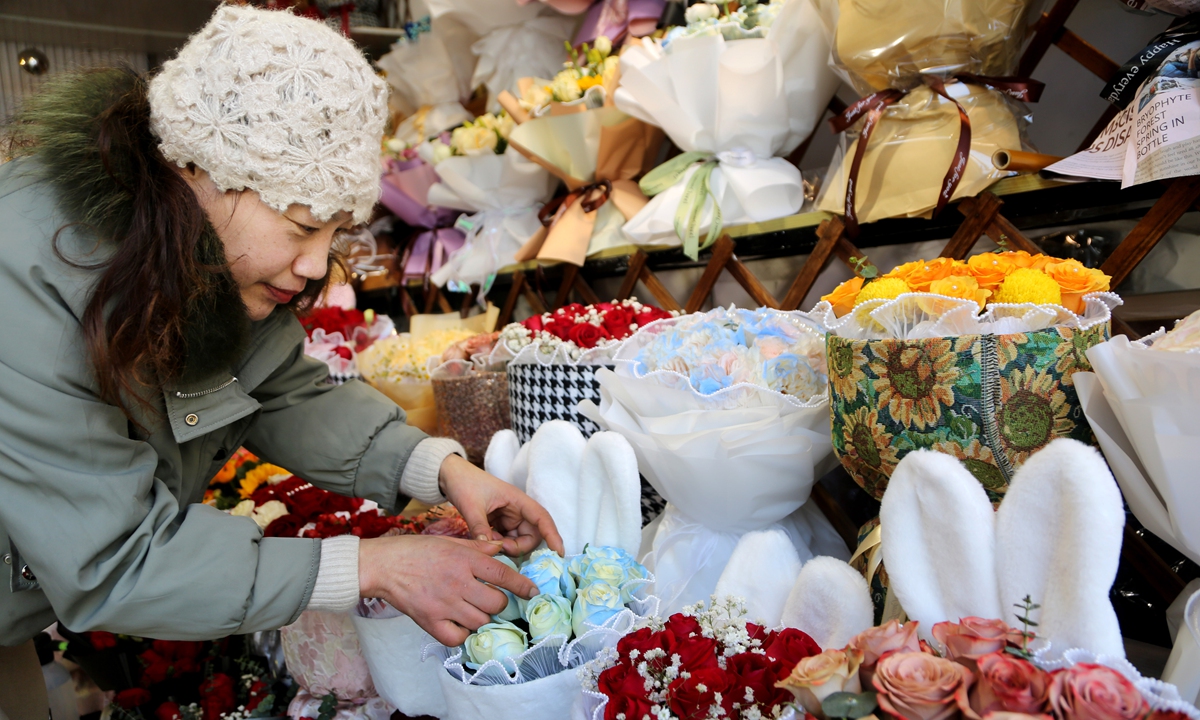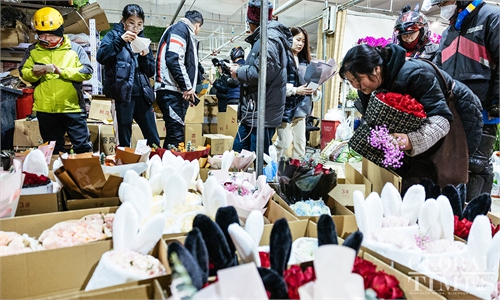ARTS / CULTURE & LEISURE
Shared values have more weight than ever in Chinese relationships

A florist arranges rose bouquets at a flower shop in Lianyungang, East China's Jiangsu Province, on February 13, 2023. Flower shops are seeing a big surge in sales as Valentine's Day is just around the corner - and rose prices are nearly double those of previous years. Photo: IC
Amid the rise of high technology and economic shifts, gender issues are constantly at the fore of today's rapidly changing society. One of the issues that has come under the spotlight is what makes a good foundation for young Chinese to start a relationship.
Raising this question randomly to young passersby on the street, you may find that their answers have changed a great deal from how their parents would have answered this question two decades ago. According to their responses, a loving relationship is no longer about a bunch of flowers on Valentine's Day or during the Qixi Festival, but rather has become a serious social topic concerning individual values, the essence of marriage, and an exploration of a couple's inner worlds that goes beyond simple material pursuits. Qixi Festival is also known as the Double Seventh Festival falling on the seventh day of the seventh month of the Chinese calendar. It dates back to a legendary romantic story from the Han Dynasty (206BC-AD220).
On the Valentine's Day on Tuesday, a simple street interview segment that asked the above-mentioned question sparked heated discussion on Chinese social media platform. People showed stunningly similar attitudes toward romantic relationships as they put "shared values" above all other requirements such as life savings, appearance and family background. Relevant terms such as "soulmates," "near-constant companion" and "mentally match" were some of those most used by the interviewees.
In many responses, the Myers-Briggs Type Indicator (MBTI) personality typology was constantly brought up. This introspective self-report questionnaire, once used by HR at some companies to recruit the most compatible interviewees for jobs, is now widely used by young people to find a match for themselves and their friends.
Behind this shift is a change in young people's attitude toward marriage. In the past, marriages were mostly seen as "marriages of destiny," as Chinese sociologists referred to in academic terms. In the past, society emphasized family interests, and individual survival was directly connected to one's family, so the point of marriage was mainly to continue the family line.
Yet in modern society, marriage has a new name-marriage of love. As contemporary society pays more attention to the interests of the individual, people no longer simply pursue survival but a better life. As such, the point of marriage has become achieving personal happiness, which is determined by a couple's economic foundation and social development.
Although young people's attitude toward love and marriage are drastically changing, this doesn't mean that they have a negative attitude toward love. Instead, a survey published on Tuesday by the Chinese Soul App Research Institute shows that young people are more eager to get married than ever before.
Among the 1,618 Generation Z interviewees who took the survey, more than 80 percent said they look forward to stepping into marriage and nearly 10 percent said they hope to get married while skipping "all the troublesome etiquette."
While picky and strict about love and marriage, young Chinese are also eager about marriage at the same time. These seemingly contradictory directions confirm that young people have a responsible attitude toward serious relationships. Marriage is no longer inevitable like it was in the past, but rather an important watershed as people's identities shift with age. They are eager to make positive identity shifts in life, so a couple can be their better selves together.

